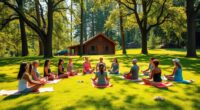To maximize your rest during vacation, choose accommodations with good soundproofing, blackout curtains, and comfy bedding. Adjust your sleep schedule gradually before traveling and get plenty of natural light once you arrive to reset your internal clock. Use white noise apps or noise-cancelling headphones to block out disturbances, and try relaxation techniques like meditation or gentle exercise. Smart sleep gear and trackers can also help optimize your rest. Stay tuned for more tips to make your trip revitalizingly restful.
Key Takeaways
- Choose accommodations with soundproofing, blackout curtains, and comfortable bedding to create a sleep-friendly environment.
- Adjust your sleep schedule gradually before travel and get natural light upon arrival to reset your circadian rhythm.
- Incorporate relaxation techniques and moderate exercise to reduce stress and promote restful sleep during your trip.
- Use sleep technology like noise-cancelling headphones, white noise apps, and sleep trackers to optimize your sleep environment.
- Stay hydrated, avoid caffeine near bedtime, and select sleep-conducive foods to enhance rest and recovery on vacation.

Vacations are meant for relaxation and adventure, but they can also disrupt your sleep routine. When you’re away from home, it’s easy to toss your sleep schedule out of whack. To guarantee you get quality rest, focus on choosing sleep-friendly accommodations that support your sleep needs. Look for hotels with soundproofing, blackout curtains, and comfortable bedding. These travel gear essentials can make a significant difference in how well you sleep, especially after long travel days. A dark, quiet environment minimizes disturbances, helping you fall asleep faster and enjoy deeper rest. Also, pay attention to room temperature; a cool, comfortable setting promotes better sleep. If noise is unavoidable, white noise apps or noise-cancelling headphones can mask background sounds, making it easier to drift off. Selecting accommodations away from main roads or noisy areas reduces disruptions, and investing in quality bedding can elevate your comfort level, guaranteeing you wake up refreshed. Incorporating sleep environment optimization strategies such as maintaining a consistent sleep space can further enhance rest quality during travel. Managing jet lag is vital for maintaining your sleep cycle while traveling. Gradually adjusting your sleep schedule before departure helps your body adapt to the new time zone. Upon arrival, exposure to natural light can reset your circadian rhythm, so spend time outdoors during daylight hours. If needed, melatonin supplements can aid in shifting your sleep times, but avoid caffeine close to bedtime, as it can interfere with falling asleep. Staying well-hydrated also helps reduce jet lag symptoms, keeping your energy levels steady and minimizing fatigue that hampers restful sleep.
Choose soundproofed, dark, and comfortable accommodations to maximize restful sleep during travel.
Incorporating sleep-enhancing activities into your travel routine can make a noticeable difference. Relaxation techniques, like deep breathing, meditation, or yoga, help reduce stress and calm your mind before sleep. Physical activity during the day not only boosts your energy but also promotes better rest at night. When it comes to your diet, avoid heavy meals close to bedtime. Instead, opt for sleep-conducive foods like kiwis or herbal teas, which can help you relax and fall asleep faster. Proper timing of caffeine intake ensures you stay energized without disrupting your sleep later. Engaging in moderate aerobic exercise during the day can also improve sleep quality.
Using technology can further optimize your sleep. Sleep trackers provide insights into your sleep patterns, helping you identify areas for improvement. Noise-cancelling headphones and white noise apps create a peaceful environment, especially in unfamiliar surroundings. Smart alarms wake you during lighter sleep phases, reducing grogginess, while sleep apps with guided meditations can help you unwind and fall asleep more easily. Incorporating these strategies, along with choosing the right travel gear and enjoying local cuisines that promote relaxation, allows you to prioritize sleep even while exploring new destinations. When you maximize your sleep quality on vacation, you return home feeling truly refreshed and ready for your next adventure.
Frequently Asked Questions
How Can I Adapt My Sleep Schedule Across Multiple Time Zones?
To adapt your sleep schedule across multiple time zones, start with jet lag remedies like gradually shifting your sleep times before traveling. During travel, get morning light eastward and evening light westward to reset your internal clock. Stay hydrated, avoid stimulants, and maintain consistent routines. Use blackout curtains and short naps to ease sleep disruptions. This approach supports a smooth sleep schedule adjustment and helps you recover faster from time zone changes.
What Are the Best Travel Pillows for Maintaining Spinal Alignment?
Perfectly supportive travel pillows prioritize pillow materials and ergonomic design features to promote spinal stability. Memory foam molds to your neck’s natural curve, while buckwheat-filled options offer customizable firmness. Ergonomic wrap-around or U-shaped designs stabilize your head and neck, preventing tilt and strain. Look for pillows with adjustable firmness, breathable covers, and compact construction to guarantee supportive, secure sleep on the go, maintaining healthy spinal alignment effortlessly during your journey.
How Does Jet Lag Affect Sleep Quality During Vacations?
Jet lag causes significant circadian disruption, leading to poorer sleep quality during your vacation. You might experience reduced REM and deep sleep, increased wakefulness, and difficulty falling asleep. To minimize these effects, consider taking melatonin supplements and adjusting your light exposure before traveling. These strategies help realign your circadian clock faster, improving sleep quality and ensuring you feel rested and refreshed during your trip.
Are There Specific Foods That Promote Better Sleep While Traveling?
Certain travel snacks and bedtime beverages can gently guide you into restful sleep. Opt for magnesium-rich foods like pumpkin seeds or leafy greens, and try tart cherry juice or kiwifruit, which naturally boost melatonin and serotonin. Incorporate calming herbal teas or chamomile as bedtime drinks, and avoid sugary snacks that disrupt sleep. These choices help balance your body’s rhythms, making your nights more restorative even amidst travel adventures.
What Are Quick Relaxation Techniques to Improve Sleep on the Go?
You can improve sleep on the go with quick relaxation techniques like mindfulness exercises, focusing on your breath or sensations to quiet your mind. Incorporate aromatherapy methods, such as using lavender or chamomile essential oils, to create a calming environment. Deep breathing, visualization, and gentle stretching also help relax your body fast. These simple strategies can ease pre-sleep anxiety and help you fall asleep more easily during travel.
Conclusion
Remember, a well-rested vacation is a happy vacation. By prioritizing sleep and following these tips, you’ll return home feeling refreshed and ready to tackle anything. Don’t forget, “Early to bed and early to rise makes a person healthy, wealthy, and wise.” So, listen to your body, stay consistent, and enjoy every moment of your trip—because good sleep isn’t just a luxury, it’s the secret to truly recharging your mind and body.









